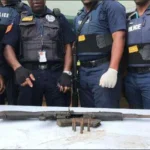MAGDEBURG, Germany – In a horrifying episode just days before the festive season, a speeding SUV tore through a bustling Christmas market in Magdeburg, claiming five lives and inflicting injuries on more than 200 people. The devastating scene immediately sent shockwaves across Germany, recalling the traumatic 2016 Berlin market attack and casting a somber pall over holiday preparations.
A Community Shaken
Among the five fatalities was a young child, heightening the sense of collective grief. Witnesses described the sound of the engine roaring moments before onlookers were forced to leap out of the way. Emergency personnel from across the region rushed to the site; those injured were dispersed to multiple hospitals, leading to an outpouring of support and donations from nearby communities.
Debris and overturned merchandise remained scattered in the aftermath, while local authorities sealed off the area to allow forensic experts and investigators to sift through evidence. The city swiftly cancelled the remainder of the Christmas market out of respect for the victims and their families.
Suspect’s Profile and Possible Motive
Authorities identified the primary suspect as Taleb al-Abdulmohsen, a 50-year-old Saudi national known for his critical views of Islam and for publicly voicing displeasure over Germany’s immigration policies. Contrary to the assumption of a jihadist link, early leads suggest a personal vendetta against Germany’s handling of asylum seekers, especially from Muslim-majority regions.
Records show that, despite being a psychiatrist, Abdulmohsen repeatedly aired concerns online about German authorities. He had even described himself as an atheist with deep-seated skepticism toward religion in general. Investigators point to evidence that he felt Germany was too lenient in welcoming refugees, while not offering enough specific aid to Saudi Arabian dissidents like himself.
Officials also confirmed that Abdulmohsen had previously assisted Saudi women fleeing restrictive conditions at home, indicating a complex background that includes advocacy mixed with resentment. Taha Al-Hajji, from the Berlin-based European Saudi Organisation for Human Rights, portrayed him as “unstable” with “outsize self-importance.” Despite a past police review of his situation, he was not flagged as a direct threat.
Leadership Condemnation and Calls for Unity
Chancellor Olaf Scholz joined local and national dignitaries in condemning the rampage as an act of “unthinkable brutality.” Standing by a memorial of flowers and candles at Magdeburg’s historic Johanneskirche, Scholz affirmed the government’s resolve to hold the perpetrator accountable “with every legal means available.” He also stressed the need for unity, urging Germans not to let hatred and suspicion overshadow the spirit of the holidays.
President Frank-Walter Steinmeier attended a church service for the victims, where local residents offered prayers, lit candles, and left messages of support for grieving families. Church bells rang out across the region at the exact time of the attack the previous evening, marking a moment of collective silence.
Political Ramifications
The attack has reignited a fiery debate over immigration and national security, especially with state elections looming. Far-right factions, including the Alternative for Germany (AfD), have seized upon the incident to spotlight what they see as lax immigration enforcement. Critics, meanwhile, caution against demonizing newcomers and insist the focus remain on the suspect’s individualized motives.
Interior Minister Nancy Fraser confirmed that the perpetrator’s statements carried “an unmistakable Islamophobic tone.” She also pointed to evidence that dissatisfaction with how Saudi refugees are handled may have fueled his actions, rather than radical religious motivations. Despite these revelations, she maintained that Germany remains a place of tolerance and vowed to prevent this tragedy from sowing further discord.
International Support
Leaders from around the globe extended condolences, among them U.S. President Joe Biden, who expressed solidarity with the German people as they reel from another holiday-season tragedy. Chancellor Scholz acknowledged the outpouring of sympathy and underscored that Germany appreciates the backing of the international community in times of crisis.
Heightened Caution During Festivities
In the aftermath, local officials ramped up security at other Christmas markets and public gatherings. Additional patrols were visible in major cities like Hamburg and Leipzig. Community members expressed both sorrow and determination, vowing not to allow fear to extinguish Germany’s cherished holiday traditions.
In an emotional reflection of the city’s collective shock, Michael Raarig, a longtime Magdeburg resident, spoke of his disbelief: “I never thought something like this could happen here in our quiet town. We will remember those we lost, and we must come together.”
Though grief and anger linger, many citizens remain resolute: they intend to stand firmly behind the principles of compassion and inclusivity that have long been part of Germany’s social fabric. Despite the tragedy, the call for greater understanding and unity resonates powerfully, echoing through the hushed streets of Magdeburg as the nation braces itself for the holidays under a cloud of mourning and reflection.






